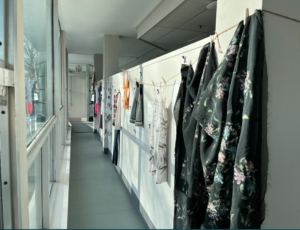By Sarah Maetche and Carlia Schwab
Like so many out there, we have been combing through the depths of Twitter and reading story after story on the Johnny Depp vs. Amber Heard defamation trial. After six weeks of testimony, and with the jury currently in deliberation at the time of writing, society has seen a gut-wrenching exposure of these two working actors’ relationship.
Depp, known from the Disney Pirates of the Caribbean franchise and Tim Burton films to name a few, claims a 2018 op-ed written by Heard where she described herself as “a public figure representing domestic abuse,” defamed him – his career and his reputation.
Heard, known from films like Aquaman, Justice League and The Danish Girl, has countersued with the claim that Depp’s attorney called her abuse allegations a “hoax.”
The defamation trial taking place in Virgina has been live-streamed and watched by millions across the globe. Depp has received waves of support on TikTok and Twitter, showing the scales of social media justice seem to be tipped his way.
Depp and Heard were married in 2015 after meeting on the set of the film The Rum Diary. Their relationship has been volatile with a highly public divorce, multiple court appearances and accusations of both verbal and physical abuse, including sexual violence during their relationship. The defamation trail has become yet another vehicle baring the shell of their relationship.
After the verdict of the trial is heard, the court of public opinion will also have its’ ruling. In the aftermath of this over exposure, there is much we can learn from this case and how it translates into a review of support services for all survivors of domestic violence.
Individuals will no doubt offer their opinions of the pair’s relationship, the information brought to light during the trial and the outcome of the trial, often in strong alignment to either Heard or Depp’s experiences.
Open dialogue and conversations are needed in this space, shifting away from a Depp vs. Heard, “she said vs. he said” narrative, or victim blaming statements towards an empathetic understanding that both individuals have experiences of being harmed by violence and participating in harmful, often violent, behaviors.
We can learn a lot from this case, in particular how society attributes violence and victim-identifying characteristics disproportionately to one gender over another. Media and public opinion often portray domestic violence impacts and the realities of survivors as highly one-gendered and female supported, often to the detriment of male identified survivors who are too looking for support.
Placing fame, wealth, socio-economic status, popularity, power, privilege, gender and sexual orientation aside, both male and female identified individuals can be impacted by and be survivors of domestic violence.
When engaging in conversations, providing support to disclosures of violence, and deep diving into media stories, we encourage individuals to focus not only on what their beliefs, thoughts and attitudes are about this case, but to be open to alternative ways of understanding domestic and relationship violence. Every individual who has experience violence should be offered support and understanding. They should have access to support without the fear of judgement, retribution, victim blaming or of not being believed.
Over half of adult Albertans have supported, or knows someone, who has experienced sexual violence. Given the highly public and social nature of the Depp vs. Heard defamation case, consider the tone of conversations you have. You can offer an open, unbiased and supportive space for your friends, family and peers to connect and debrief, and seek out resources for support. Remember that anyone of any gender can be impacted by violence and deserves access to support.
Sarah Maetche is the communications and administration manager at the Central Alberta Sexual Assault Support Centre. Carlia Schwab is the education and community relations manager at the Central Alberta Sexual Assault Support Centre.
Article as published in the Red Deer Advocate.


